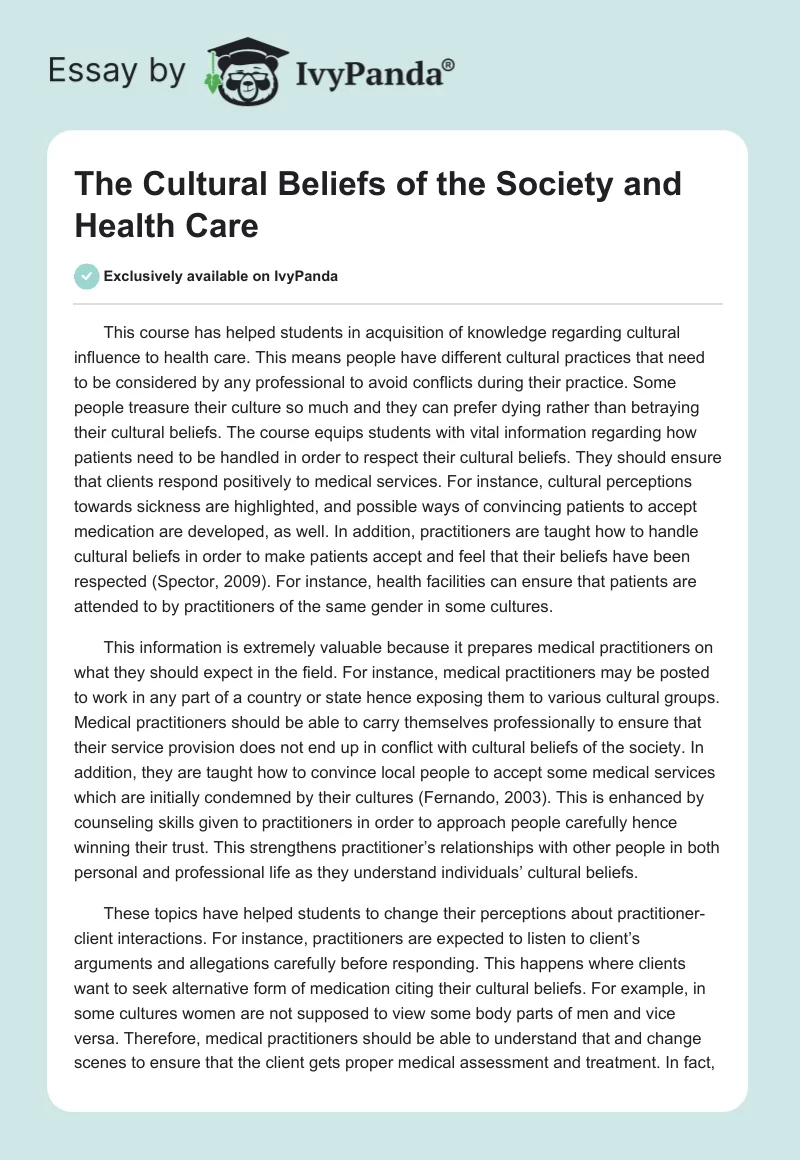Imagine you’re a doctor, treating a patient who refuses to eat certain foods. You ask why, and they explain it’s due to a long-held family tradition. How do you navigate this situation while respecting their cultural beliefs and ensuring their well-being? This scenario highlights the complex intersection of culture and healthcare, where individual beliefs often shape medical choices and impact treatment outcomes.

Image: ivypanda.com
Understanding the diverse cultural beliefs that influence healthcare is crucial for providers to deliver effective and patient-centered care. This article will explore various examples of how cultural beliefs shape healthcare decisions, highlighting the importance of respecting cultural differences to foster trust and improve patient outcomes.
Cultural Influences on Diet and Nutrition
Food plays a central role in many cultures, extending beyond sustenance to encompass religious practices, social rituals, and personal identity. Dietary restrictions based on cultural beliefs can impact health in several ways:
Religious Dietary Laws:
Many religions have specific dietary rules that guide food choices:
- Halal and Kosher: Muslims and Jews adhere to strict dietary laws, prohibiting the consumption of pork and other unclean animals. They also have specific rules regarding food preparation and slaughter.
- Hinduism: Some Hindus practice vegetarianism or avoid certain foods like beef, pork, and eggs, based on their beliefs about reincarnation and the sacredness of life.
- Buddhism: Many Buddhist traditions promote vegetarianism or veganism, emphasizing compassion for all living beings.
Traditional Cuisines:
Cultural cuisines often reflect the resources and traditions of a specific region. While providing essential nutrients, some traditional dishes might be high in fat, salt, or sugar, contributing to health issues like obesity, diabetes, and cardiovascular disease.

Image: www.pinterest.com
Cultural Food Taboos:
Various cultures have food taboos based on beliefs about their properties or symbolic meanings. For example, pregnant women in some cultures avoid certain foods perceived as harmful to the fetus.
Cultural Beliefs and Medical Practices
The ways individuals approach illness and treatment often differ based on their cultural backgrounds. This can influence their attitudes towards healthcare professionals, their preferred treatment methods, and their willingness to participate in medical procedures.
Traditional Medicine:
Many cultures rely on traditional healing practices alongside modern medicine. These can include:
- Ayurveda (India): Emphasizes a holistic approach to health, integrating diet, lifestyle, herbs, and spiritual practices.
- Traditional Chinese Medicine (China): Utilizes acupuncture, herbal remedies, massage, and other techniques to balance the flow of vital energy (Qi) in the body.
- Native American Medicine: Emphasizes the connection between humans, nature, and spirituality, often employing herbal remedies and ceremonies for healing.
Views on Pain and Illness:
Cultural beliefs can influence how individuals perceive and express pain, affecting their willingness to seek medical attention and their compliance with treatment plans.
For instance, some cultures value stoicism and may suppress pain expressions to avoid appearing weak. Conversely, others may openly express pain and rely on emotional support from family and community.
Cultural Beliefs and End-of-Life Care
Cultural beliefs also shape attitudes towards death and dying, impacting end-of-life care decisions. Some cultures may prioritize prolonging life at all costs, while others focus on comfort and palliative care.
Advance Directives and Organ Donation:
Cultural beliefs can influence the acceptance of advance directives, which outline individuals’ wishes regarding end-of-life care. Similarly, viewpoints on organ donation can differ widely, based on religious beliefs, cultural norms, and personal values.
Rituals and Mourning Practices:
Cultural traditions dictate various rituals and practices associated with death and mourning. These can include:
- Funeral ceremonies: Varying in duration and formality depending on cultural practices.
- Mourning periods: Specific periods of time for grieving and commemorating the deceased.
- Burial practices: Different cultural customs regarding the burial of the body.
Addressing Cultural Beliefs in Healthcare:
To provide culturally competent care, healthcare professionals must be aware of the potential impact of cultural beliefs on patients’ health and engage in culturally sensitive practices. Here are some strategies:
- Cultural Humility: Recognizing one’s own biases and limitations while seeking to understand and respond to the values and beliefs of patients from diverse backgrounds.
- Active Listening: Paying close attention to patients’ narratives and understanding their experiences through their lens.
- Cultural Assessment: Asking about patients’ cultural backgrounds, beliefs, and preferences for healthcare. This information can be gathered through a brief questionnaire or conversation.
- Collaboration: Working with interpreters, community health workers, and culturally specific resources to bridge language and cultural barriers.
- Respectful Communication: Using culturally sensitive language, avoiding generalizations, and respecting patient autonomy and decision-making.
The Importance of Cultural Sensitivity in Healthcare:
Understanding cultural beliefs in healthcare is crucial for several reasons. It helps to:
- Build Trust: Patients are more likely to trust and engage with healthcare providers who demonstrate respect for their cultural beliefs.
- Improve Adherence: Understanding and accommodating cultural beliefs can enhance patients’ adherence to treatment plans, leading to better health outcomes.
- Reduce Health Disparities: Cultural sensitivity is essential to address health disparities that often stem from systemic biases and lack of culturally appropriate care.
- Promote Patient-Centered Care: Putting the patient at the center of the care process, considering their cultural background and preferences.
Cultural Beliefs In Healthcare Examples
Conclusion:
Cultural beliefs play a significant role in shaping healthcare experiences and outcomes. By acknowledging and respecting cultural differences, healthcare professionals can cultivate better doctor-patient relationships, improve care quality, and create a more equitable healthcare system. As the world becomes increasingly diverse, understanding cultural beliefs is not merely a matter of courtesy but a critical skill for delivering effective and truly patient-centered care.
This article has explored various examples of cultural beliefs impacting healthcare. It’s a complex and ongoing conversation, so we encourage you to continue learning about cultural influences on health and share your insights and experiences with others! Together, we can foster a more inclusive and culturally sensitive healthcare landscape for all.






